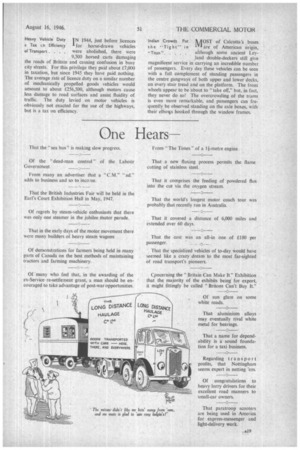Passing Comments
Page 20

Page 21

If you've noticed an error in this article please click here to report it so we can fix it.
The Delivery. of Six WE are certainly living in Calf-dozers by Para" advanced times, at least in chute some directions. Recencly an inquiry for six Aveling-Barford calf-dozers (small editions of the bull-dozer) was received, and it was stipulated that, owing to the inaccessibility of the site, which is believed to be in the oilfields of Ecuador, they were to be delivered by parachute. We hope that if they be conveyed by air and delivered in this manner they will have a soft landing.
Long Service with 110 ATE of turnover of perthe Midland "Red" " sonnel is a sure guide to Rewarded . . the state of morale in any commercial undertaking. The ' Midland " Red " is obviously a happy concern, for 1,601 workers of all grades have been in continuous service of the company for over 15 years. Of these, 441 have served for over 25 years, 186 for over 30 years, 52 for more than 35 years, and 22 have completed 40 years' service. In addition, there are 119 ex-employees who have retired on a weekly gratuity from the company after long service, apart from receiving money under the company's pension scheme.
Is Road Transport to THE .following conversation be Entirely EliminI was overheard by a friend ated . of ours recently in the public bar of a small inn in Wiltshire. One of the parties had just entered and was obviously a cyclist, for he was using trouser clips. Most likely, too, he was a railwayman, judging by the shape and colour of his overalls. The other man was an ordinary countryman. Cyclist: "The roads are more than ever cluttered up with motors these days. I don't like 'em."
Countryman: "They're bound to get worse and not better when this 'ere petrol ration is increased.'
Cyclist: "Oh, I don't mind motor cars so much, it's they big lorries that worry me. However, they won't be on the road so much longer."
Countryman: "What do you mean by that?"
Cyclist: "Well, I understand that they was to have finished this 'ere August, but they've 'ad a reprieve for a year. I can see what is behind that. At the end of a year they're going to be told 'No more 'eavy lorries.'" 'Countryman: "Do you really think so? And what will they do with the stuff these 'eavy lorries carry?"
Cyclist: "Oh, that'll go on the rail and the proper place for it. Then these 'ere roads will be fit to cycle on again."
THE plating of cylinder walls I with chromium is one method of obtaining extremely long-wearing life, but, according to tests which have been carried out in America, a smooth, non-porous surface has been found unsatisfactory in the case of i.c. engines, because the piston rings wipe off the oil too completely. To obviate this, the Van Der Horst Corporation has developed what is known as the Porous-Krome plating process. In this, controlled, reverse deplating produces microscopic pores and oil channels in the hard surface, thus retaining the lubricant. According to "Transport Topics," in an oil engine treated in this manner and used in a tractor and semi-trailer outfit, the wear in 100,000 miles was only .002 in.
Obtaining Good Lubrication In Chromiumplated Bores . .
Heavy Vehicle Duty IN 1944, just before licences a Tax cn Efficiency 1 for horse-drawn vehicles
of Transport. . . were abolished, there were 9,500 horsed carts damaging the roads of Britain and causing confusion in busy city streets. For this privilege they paid about £7,000 in taxation, but since 1945 they have paid nothing. The average rate of licence duty on a similar number of mechanically propelled goods vehicles would amount to about £256,500, although motors cause less damage to road surfaces and assist fluidity of traffic. The duty levied on motor vehicles is obviously not exacted for the use of the highways, but is a tax on efficiency. Indian Crowds Put lk /10ST of Calcutta's buses the "Tight" in IVI are of American origin, "Titan" although some ancient Ley land double-deckers still give magnificent service in carrying an incredible number of passengers. Every day these vehicles can be seen with a full complement of standing passengers in the centre gangways of both upper and lower decks, on every stair tread and on the platform. The front wheels appear to be about to "take off," but, in fact, they never do so! The overcrowding of the trams is even more remarkable, and passengers can frequently be observed standing on the axle boxes, with their elbovs hooked through the window frames.




































































